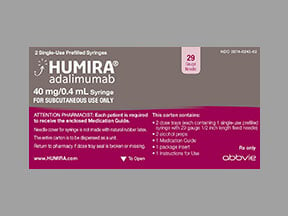
Humira (2 Syringe) Coupons & Savings Card – Discount Prices from $6029.24
My prescription
Edit
40MG/0.4ML, Humira (2 Syringe) (2 Prefilled Syringe Kits)
Select pharmacy

Walgreens
$6029.24
COUPON PRICE
Albertsons
$6747.48
COUPON PRICE
Walmart
$7193.18
COUPON PRICEHumira (2 Syringe) savings card
Show this card to your pharmacist
Walgreens
$6029.24
BIN
ID
PCN
GRP
019876
LHA3945BD6
CHIPPO
LHX
Powered by
Price history for Humira (2 Syringe)
2 Prefilled Syringe Kits, 40MG/0.4ML
Average retail price for Humira (2 Syringe)
Average SaveHealth price for Humira (2 Syringe)
Our price history data is based on aggregated prescription data collected from participating pharmacies in America. Our prescription data updates daily to reflect the latest price changes. If you notice a missing data point, it means there wasn't sufficient data available to generate a monetary value for that date.
*Retail prices are based on pharmacy claims data, and may not be accurate when we don't have enough claims.
Humira (2 Syringe) dosage forms
Dosage Quantity Price from Per unit 10MG/0.1ML 1 Prefilled Syringe Kit $3014.49 $3014.49 10MG/0.1ML 2 Prefilled Syringe Kits $6029.24 $3014.62 10MG/0.1ML 3 Prefilled Syringe Kits $9043.98 $3014.66 20MG/0.2ML 1 Prefilled Syringe Kit $3014.49 $3014.49 20MG/0.2ML 2 Prefilled Syringe Kits $6029.24 $3014.62 20MG/0.2ML 3 Prefilled Syringe Kits $9043.98 $3014.66 40MG/0.4ML 2 Prefilled Syringe Kits $6029.24 $3014.62 40MG/0.4ML 1 Prefilled Syringe Kit $3014.49 $3014.49 40MG/0.4ML 3 Prefilled Syringe Kits $9043.98 $3014.66 40MG/0.8ML 1 Prefilled Syringe Kit $3004.23 $3004.23
| Dosage | Quantity | Price from | Per unit |
|---|---|---|---|
| 10MG/0.1ML | 1 Prefilled Syringe Kit | $3014.49 | $3014.49 |
| 10MG/0.1ML | 2 Prefilled Syringe Kits | $6029.24 | $3014.62 |
| 10MG/0.1ML | 3 Prefilled Syringe Kits | $9043.98 | $3014.66 |
| 20MG/0.2ML | 1 Prefilled Syringe Kit | $3014.49 | $3014.49 |
| 20MG/0.2ML | 2 Prefilled Syringe Kits | $6029.24 | $3014.62 |
| 20MG/0.2ML | 3 Prefilled Syringe Kits | $9043.98 | $3014.66 |
| 40MG/0.4ML | 2 Prefilled Syringe Kits | $6029.24 | $3014.62 |
| 40MG/0.4ML | 1 Prefilled Syringe Kit | $3014.49 | $3014.49 |
| 40MG/0.4ML | 3 Prefilled Syringe Kits | $9043.98 | $3014.66 |
| 40MG/0.8ML | 1 Prefilled Syringe Kit | $3004.23 | $3004.23 |
| 40MG/0.8ML | 2 Prefilled Syringe Kits | $6008.72 | $3004.36 |
| 40MG/0.8ML | 3 Prefilled Syringe Kits | $9013.20 | $3004.40 |
How do I know if I injected Humira correctly?
To determine if Humira was injected correctly, one should ensure the following steps were followed:1. Preparation: The injection site should be clean and dry, typically on the front of the thighs or the abdomen, avoiding the navel area.2. Injection Technique: The needle should be inserted at a 45 to 90-degree angle, depending on the instructions provided by the healthcare provider.3. Post-Injection: After the injection, there should be minimal bleeding or bruising. It's normal to feel a slight stinging or burning sensation during the injection.4. Medication Appearance: The solution should be clear and colorless. If it appears cloudy or contains particles, it should not be used.5. Disposal: The used syringe or pen should be disposed of in a proper sharps container.If there is any uncertainty about the injection technique or if there are unusual symptoms following the injection, it is advisable to consult a healthcare professional.
Can Humira work in 2 days?
Humira typically does not work within 2 days. It may take several weeks to notice an improvement in symptoms, as the medication needs time to reduce inflammation and modulate the immune response. The exact time frame can vary depending on the condition being treated and individual patient response.
What is a normal Humira injection site reaction?
A normal Humira injection site reaction may include mild redness, swelling, itching, or pain at the site of injection. These reactions are generally mild and tend to resolve on their own within a few days. If the reaction is severe or persists, it is advisable to consult a healthcare professional.
Is it better to inject Humira in the stomach or thigh?
The choice between injecting Humira in the stomach or thigh depends on personal preference and comfort. Both sites are commonly used and effective. Some individuals may find one site less painful or easier to access than the other. It is important to rotate injection sites to reduce the risk of irritation or discomfort. Consulting with a healthcare provider for personalized advice is recommended.
What happens if you take too much Humira?
Taking too much Humira (adalimumab) can increase the risk of experiencing side effects. Common side effects may include infections, injection site reactions, and allergic reactions. In case of an overdose, it is important to seek medical attention immediately. A healthcare professional can provide guidance and monitor for any adverse effects.
